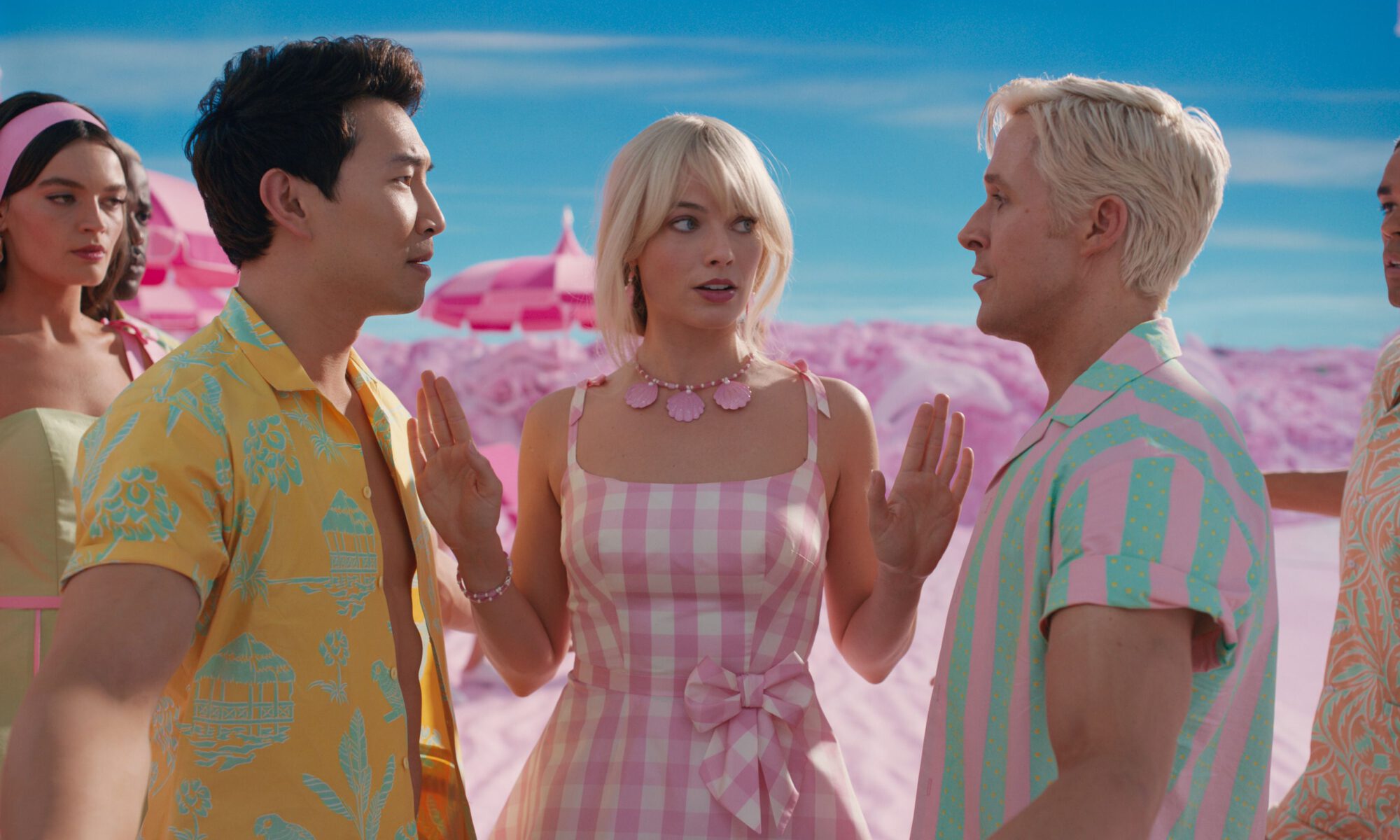Movie Info
Movie Info
- Director
- Greta Gerwig
- Run Time
- 1 hour and 54 minutes
- Rating
- PG-13
Relevant Quotes
Male and female he created them, and he blessed them and called them humans when they were created.
When I look at your heavens, the work of your fingers,
the moon and the stars that you have established;
what are humans that you are mindful of them,
mortals[a] that you care for them?

I was among those millions who made it a double feature this weekend by attending both the premier of Barbie and Oppenheimer in Cincinnati. It was quite a shift going from one to the other (especially with just one minute between the two), but made for an exhilarating cinematic experience, both films being very good. I was thankful for the TIME Magazine article that convinced me that I should watch Barbie despite my many reservations regarding it. Yes, the film is, as I suspected, a product placement device designed to boost the sales of a toy, but it also contains remarkable satirical scenes and one that contains an impassioned speech decrying the contradictions faced by females in America’s still patriarchal-infected society—a speech that most mothers (and enlightened fathers) would be happy for their daughters (and sons) to take in.
The laughs begin with a prelude that shows several primitively dressed girls playing with baby dolls as narrator Helen Mirren intones, “Since the beginning of time, since the first little girl ever existed, there have been dolls. But the dolls were always and forever baby dolls, until…” the legs of a tall figure appear and we hear the opening theme of 2001: Space Odyssey. The girls look up at a towering Barbie Doll attired in a bikini. Awed by the huge doll, the little girls begin smashing in the heads of their baby dolls. One of these is thrown up into the air. Just as in Stanley Kubrik’s film the alien monolith altered the ape-men’s world, so the advent of the Barbie Doll changed the world of little girls forever. They are no longer, it is implied, restricted to the sole roll of motherhood and housewife. Thus, we see that Greta Gerwig, with a big assist from her co-writer Noah Baumbach, is firmly in control of this big corporate-sponsored project.
After the credits, the narrator takes us to Barbie Land, the pink-colored world where “Stereotypical“Barbie (Margot Robbie) reigns supreme over a neighborhood of women, all named Barbie, played by Issa Rae, Sharon Rooney, Dua Lipa, Emma Mackey, and others. Barbie’s days are perfect as she rises to spend time with her friends and drive around in her topless pink roadster. There is also “Weird Barbie”—the result of a bored adolescent girl who whacked off much of Barbie’s hair and smeared her face with paint. The women live in modernistic pink houses with no walls and hold all positions of power—the Presidency (Issa Rae), a renowned scientist (Emma Mackey), a Nobel Prize-winning author ((Alexandra Shipp), Lawyer Barbie (Sharon Rooney), members of the Supreme Court–even the faces of Mt. Rushmore are women. For Barbie it is a perfect world, though to our eyes everything is obviously artificial (delightfully so).
Oh yes, there are men, mostly named Ken, Barbie’s friend played by Ryan Gosling. Other Kens are played by John Cena, Kingsley Ben-Adir, Simu Liu, Scott Evans and others. However, they are more hanger ons than the power holders of society. Beach Ken, it is noted, comes to life only when Barbie notices him. He seems built mainly to look good on the beach, thus his designation. He would love to spend more time with Barbie but is thrust out of her house because every night is Girls’ Night. She firmly rejects his suggestion that they are boy-friend-girlfriend. There is also Ken’s friend Allan (Michael Cera).
One day, Barbie’s rising in the morning and effortlessly levitating into her car (all this reflecting how a real girl moves her Barbie around her playroom) is marred by a glitch or two. Worse, at a dance party the thought of dying enters Barbie’s mind. As she expresses this out loud, the music and dancing suddenly stops. The other Barbies are aghast at the thought. A long silence contrasts with the earlier liveliness. Barbie recovers by saying that she is dying to do (something or other). Other mishaps that occur include a cold shower, falling rather than gently floating into her car, and Barbie’s carefully molded feet, so as to fit into her high heels, becoming flat. Even worse, she discovers a small patch of cellulite on her leg. What has happened to her “perfect world”?
Worried, she visits Weird Barbie who lives off by herself because of her disfigured face. She informs her visitor that there is a malfunction in the barrier separating Barbie Land from “The Real World.” The connection with the real child playing with her has been disrupted, so she must go there and find her to restore normality. Barbie, starting out in her little car, is surprised when Ken pops up in the back seat. He insists on accompanying her, reassuring her that he has brought along their bright yellow line-skates. Their journey involves a funny sequence of travel by very artificial looking means dressed in variously appropriate costumes. (You can see this in the preview on IMDB.com.)
Once they enter the “Real World,” they end up, of all places in the most artificial part of that world, Los Angeles’ Venice Beach. As they skate along, they become quite the spectacle to onlookers, and when some of the men seek to do more than stare lustily at Barbie, the pair fight back. They are arrested twice shortly after their arrival. Soon Barbie is up against Matel CEO (Will Ferrell) and his all-male board and encountering the pair that caused her feeling of malaise, Matel employee Gloria (America Ferrara) who had been playing with her daughter Sasha’s (Ariana Greenblatt) Barbie. The teenager upbraids Barbie for setting such unrealistic beauty standards that cause so many girls so much anguish. The two humans help Barbie in a madcap escape from Matel’s staff, with Barbie, accompanied by Gloria and Sasha, traveling back to Bar—No, the sign now reads “Ken Land.”
Ken, left on his own, had discovered this world to be very male-oriented. For the first time he had felt important, so returning before Barbie, he had injected paternalistic values into his fellow Kens. Dressed in a lavish mink coat, he leads the Kens in taking over affairs from the other Barbies. The women become maids, housewives, or the kind of girlfriend at the beck and call of her Ken. The Kens even have set a date to vote patriarchy into the constitution. Barbie is unable to convince Ken that matters should return to their former estate. She becomes depressed, and it is then that Gloria delivers her St. Crispen Day-like speech describing the contradictions that women have long been forced to endure. It is a ringing manifesto that so reinvigorates Barbie that she and her new friends are able to join with Weird Barbie and others to overcome the Kens and…
There are so many funny touches, such as in Real World Barbie drinks from a cup and spills the liquid over herself. Surprised because, just as children playing with dolls pretend to pour and drink, in Barbie Land she had never actually drunk anything. At Matel the CEO orders that the runaway Barbie, be caught and “put back in her box.” I think some children, as well as their parents, will catch the symbolic meaning of this referral to what a patriarchal world attempts to do to women. Also, Barbie meets the spirit of the creator of Barbie and co-founder of Matel, Ruth Handler (Rhea Perlman), who explains that Barbie will forever be evolving, never “finished.” And the delightful ending, made more so if you recall that Barbie earlier had said that she had no vagina and Ken no genitals.
People of faith who prefer the first Creation story to that of the second one that is the basis of patriarchal society will enjoy this goofy but insightful fantasy tale. Just as the Barbie toy can justifiably be blamed for driving adolescent girls to extreme measures to become as slender as their Barbie doll, while at the same time be credited for showing little girls that they can aspire to careers outside the home, so this film holds up conflicting concepts of what it is to be a woman—and invites us to laugh during the process. Everything in the film—from the talented cast to the colorful costumes and bright settings to the music—work together to create a memorable film experience. And what an opportunity for religious groups, youth and adults, to discuss patriarchy and feminism and ways of raising our daughters and sons!
There is so much going on in every scene, so many little humorous touches, that one viewing will not be enough to catch everything. I am eagerly looking forward to a return to the theater. In the meantime, I will be thinking of the new Barbie, who has reconciled with Ken and moved on beyond Barbie Land, and how such strong women of the Bible—the three Hebrew midwives in Egypt, Miriam, Rahab, Deborah, Ruth, Esther, Mary of Nazareth, and Mary Magdalene–might welcome the transformed Barbie into their sisterhood.
Late in the film we hear Billie Eilish’s plaintive song “What Was I Made For?” (Available on YouTube in two versions, one of them including the lyrics framed by a succession of various Barbie dolls.) It’s a question Barbie must ponder as she becomes a human being, because sooner or later all humans question what is their purpose in life. “What was I made for?” is the line sung by Barbie several times in the song. It echoes the question raised by the Psalmist as that writer was confronted by the majesty of God, “what are humans that you are mindful of them,/mortals that you care for them?” One branch of Christianity answered with their Westminster Shorter Catechism, “Q. What is the chief end of man? A. Man’s chief end is to glorify God and to enjoy him forever.” Transitioning from hollow plastic plaything to a flesh and blood woman, my hope is that she may she become aware of and sustained by the Genesis affirmation that she and Ken are co-equal, created in the image of God.
This review will be in the August issue of VP along with a set of questions for reflection and/or discussion. If you have found reviews on this site helpful, please consider purchasing a subscription or individual issue in The Store.

